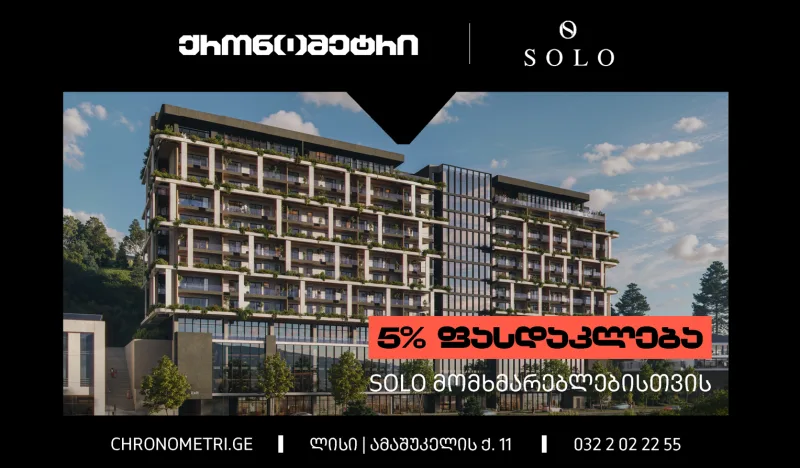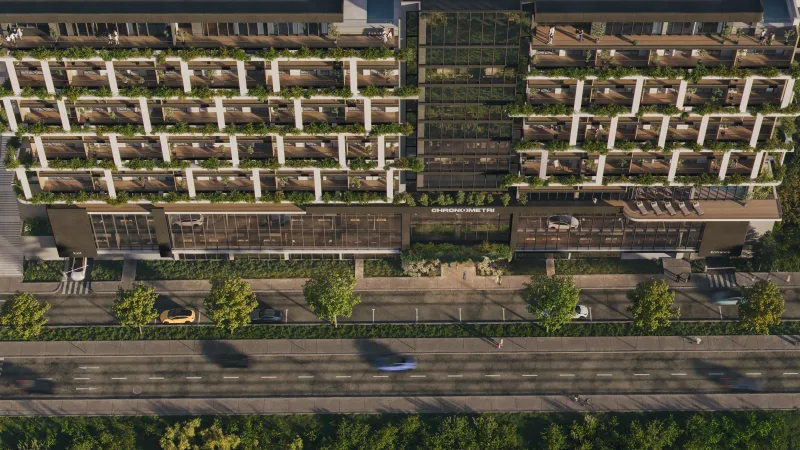Tbilisi’s real estate market has been rapidly evolving in recent years. Throughout the city, new residential complexes are being developed, the demand for modern infrastructure is increasing, and rising investment flows are speeding up urban development. This transformation has changed not only price dynamics but also buyer behavior.
Despite the wide range of options available, making the right choice is not always straightforward. Prices can fluctuate, construction standards are becoming stricter, and the quality and reliability of projects often vary. This is why understanding market trends is crucial for anyone looking to buy a home or invest in property.
In this article, we will explore the current trends shaping Tbilisi’s real estate market. We will examine how infrastructure and construction quality impact prices and what today’s buyers need to know to make informed, safe, and strategic decisions.
The Bigger Picture: Where Is Tbilisi Heading?
Tbilisi’s urban and real estate landscape is undergoing significant transformation. The city's structure is evolving, with developers increasingly adapting to modern standards. While buyers once primarily focused on square meters and price, today they adopt a more comprehensive approach, considering factors such as location, infrastructure, energy efficiency, the quality of shared spaces, and the developer’s reputation.
New construction trends are particularly noticeable in peripheral areas like Lisi, where modern, environmentally friendly residential complexes are emerging. The growing demand for these locations reflects a broader shift: buyers are looking for comfort and tranquility away from the city center while still wanting access to urban services and convenient transportation. This evolving balance between urban convenience and peaceful living is shaping the new direction of Tbilisi's development.
Additionally, developers are showing an increased interest in multifunctional projects that integrate residential, commercial, and recreational spaces. These complexes often include retail areas, workspace, and leisure facilities, allowing residents to fulfill their daily needs within a single, cohesive environment. This approach not only enhances quality of life but also creates a new model of urban living that is seamlessly connected to the city’s economic and social fabric.
Under-Construction Apartments — Price Dynamics and Key Value Drivers
Buying an apartment in Tbilisi remains a highly relevant and strategic decision, serving both personal and investment goals. In recent years, prices for under-construction properties have been steadily rising, influenced by economic factors and the pace of urban development.
As a result, today’s buyers are increasingly focused on long-term value. They consider whether the property will retain or increase its worth, the demand for the area, and the quality of the project. Consequently, apartments in Tbilisi are seen as long-term assets, providing a means to secure stable income or preserve capital.
Construction quality and technological standards have significantly improved. Modern projects increasingly utilize energy-efficient materials, thermal insulation, smart home systems, and advanced safety features. These innovations not only enhance comfort but also reduce maintenance costs and reinforce a property’s long-term value.
Apartments with Instalments — How the Model Works
Buying property through installment plans has become a common and accessible option in Georgia. This model allows buyers to secure ownership early in the process while paying gradually, making it especially appealing for those looking to purchase off-plan properties but who may not have the full amount available upfront.
The terms of these installment plans can vary based on the developer and the specific project. In some cases, buyers can benefit from in-house installment options that remain valid until construction is complete. These plans typically require a down payment ranging from 10% to 30%, followed by monthly payments scheduled in advance, often without interest, providing additional flexibility.
Alternatively, some buyers choose bank mortgages, which offer longer repayment periods but come with interest rates and stricter eligibility requirements.
Documentation: A Crucial Step in Buying Off-Plan
Ensuring the accuracy and completeness of documentation is crucial when buying an under-construction apartment. Buyers should always verify the construction permit, land ownership certificate, and the terms of the contract—especially the payment schedule, handover timeline, and mutual obligations.
The contract should clearly outline the specifications of the apartment, the standards for finishing, and the materials used in construction to avoid misunderstandings or legal disputes later on.
Profitable Investment — What to Consider Before Buying
Real estate investment in Georgia, particularly in Tbilisi, is becoming increasingly attractive. The market is expanding, and demand remains strong. However, to ensure profitability, buyers must take a strategic and analytical approach.
Start by defining your objective:
- Do you plan to rent the apartment?
- Resell it later at a higher price?
- Or simply preserve your capital?
Each goal comes with different selection criteria. For rentals, proximity to public transportation, shopping centers, and universities is essential. For resale, factors like the area's growth potential, new infrastructure projects, and buyer demand forecasts are crucial.
Additionally, adopting a long-term perspective involves understanding market cycles: knowing when to buy, how competition behaves, and how macroeconomic conditions affect real estate prices.
What Every Buyer Should Know
Investing wisely in real estate requires a clear understanding of market realities. Buyers should monitor trends such as the demand for modern infrastructure, energy-efficient housing, and mixed-use developments. It is crucial to assess not only current conditions but also to forecast future growth potential.
- Verify your information sources. Georgia’s property market becomes more complex every year. Relying solely on advertisements can be risky. Conduct independent research by reviewing the developer’s history, customer feedback, public registry data, and upcoming urban development plans.
- Prioritize flexibility. Consider how adaptable the property is to future needs, such as expanding a family, transitioning to remote work, or renting out the space later.
- Think sustainably. Modern buyers increasingly value projects that incorporate eco-friendly materials and responsible design. This focus is not just about comfort; it is also about contributing to a more balanced urban environment.
Real estate in Tbilisi continues to evolve, driven by innovation, design, and vision. For both buyers and investors, understanding these dynamics is crucial for making decisions that prioritize comfort, stability, and long-term value.
As developments like Chronometri at Lisi demonstrate, the future of living in Tbilisi lies in projects that balance nature, architecture, and intelligent planning. These developments create homes that are designed not just for today, but for decades to come.




